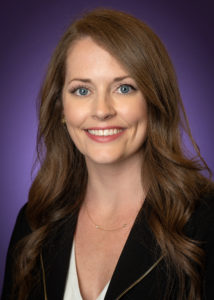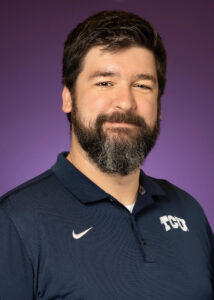 Caroline Sahba, M.Ed., MBA, LPC-S
Caroline Sahba, M.Ed., MBA, LPC-S
Caroline is the Associate Director of the Counseling and Mental Health Center, overseeing Substance Use and Recovery Services. She has a Bachelor’s degree in Psychology from the University of Texas at San Antonio and a Master’s degree in Education in Counseling from Texas Christian University. Caroline has a passion for students in recovery and recovery advocacy. She supports the Collegiate Recovery Community for students in Recovery from Substance Use Disorder and consults for other peer support communities at TCU.
Caroline is a Licensed Professional Counselor Supervisor (LPC-S) and utilizes motivational interviewing and solution-focused techniques while striving for a collaborative effort between counselor and student to identify and/or strengthen current skills necessary for future resolutions. Her areas of specialty include working with adolescents and young adults, relationships and family dynamics, resiliency, substance use, recovery, and relapse prevention. Before joining TCU, Caroline worked as a Licensed Chemical Dependency Counselor (LCDC) at a residential substance use treatment facility for adolescents in Dallas, TX. Caroline obtained her MBA with an emphasis in Health Care from TCU’s Neeley School of Business in December 2020.
 Joe LeConte, M. Ed., LCDC, LPC-Associate
Joe LeConte, M. Ed., LCDC, LPC-Associate
Under the Supervision of Caroline Sahba, LPC-S
Joe has a Bachelor’s degree in Moving Image Arts from the College of Santa Fe and a Master’s degree in Education in Counseling from Texas Christian University. Joe is a Licensed Chemical Dependency Counselor (LCDC) and uses both motivational interviewing and solution-focused techniques to connect with students. Joe cares deeply about helping students to overcome the stresses and difficulties that come during their time in college and believes the most meaningful work occurs when he can understand the client’s point of view. During his time as a graduate student, Joe worked with adolescent clients dealing with substance use issues in a residential treatment facility in Dallas, TX. Joe is also the leader of the supportive gaming community at TCU, where he utilizes tabletop roleplaying games to help students deal with anxiety, loneliness, and a lack of connectedness.
Prior to joining the SURS office, Joe worked as the Audio/Visual Coordinator in the Brown Lupton University Union (BLUU) for nine years. Before TCU, he worked in the film and television industry as a special effects technician. Joe has also worked with multiple theater groups, touring music productions and production companies as a musician, lighting designer, and sound technician. Joe’s wide background gives him a chance to connect with TCU’s diverse student population.
 Lauren Knipstein, LMFT
Lauren Knipstein, LMFT
Lauren graduated from the University of Arkansas with a Bachelor’s degree in Psychology. Upon gaining experience as Client Support and Case Management in substance use treatment facilities in Los Angeles, California, she returned to graduate school at Azusa Pacific University where she received a Master’s degree in Clinical Psychology with an emphasis in Marriage and Family Therapy. Lauren currently holds a license as a Marriage and Family Therapist (LMFT) and specializes in working with young adults, relational and family difficulties, and substance use and recovery – with a very specific passion for working with young adults exploring their autonomy upon entering a new stage of life. Lauren utilizes Cognitive Behavioral Therapy, Emotionally Focused Therapy, and Attachment Theory to explore individual needs and support each person as they reach their specific goals, as she believes that the support of the therapeutic relationship can be foundational to healing and growth.
Prior to joining TCU, Lauren worked in substance use and mental health treatment facilities in San Diego, California, as well as a community mental health organization which connected young adults to music and the arts.
TCU Substance Use & Recovery Services (SURS) is based on a philosophy of student development which incorporates personal and community wellness. Fostering self-esteem, interpersonal skill development, and a sense of belonging are key elements in helping students acquire the skills and competencies to appropriately navigate experiences with alcohol and other drugs. The SURS office encourages students to develop a sense of responsibility for themselves, for others, and for the University by assuming leadership in setting behavioral norms for the campus community.
Learn More
DFSCA Regulations
Texas Christian University endorses the Department of Education’s Drug Free Schools and Campuses Act (1989, Part 86). The regulations outlined in this act establish a set of minimum requirements for campus alcohol and other drug prevention programs. Compliance with the Drug Free Schools and Campuses Act is a condition of receiving federal funds, or any form of financial assistance under any federal program. TCU has documented through the Biennial Review that it has adopted and implemented a program to prevent the unlawful possession, use or distribution of illicit drugs and alcohol by students and employees. TCU’s biennial compliance report is located through the link on this website and in the Substance Use and Recovery Services office, 2nd floor of Jarvis Hall.
DFSCA 2022 Compliance Report
Student Handbook
For more information contact:
Substance Use & Recovery Services Office
Texas Christian University
Jarvis Hall 2nd Floor
817-257-7100

 Caroline Sahba, M.Ed., MBA, LPC-S
Caroline Sahba, M.Ed., MBA, LPC-S Joe LeConte, M. Ed., LCDC, LPC-Associate
Joe LeConte, M. Ed., LCDC, LPC-Associate Lauren Knipstein, LMFT
Lauren Knipstein, LMFT